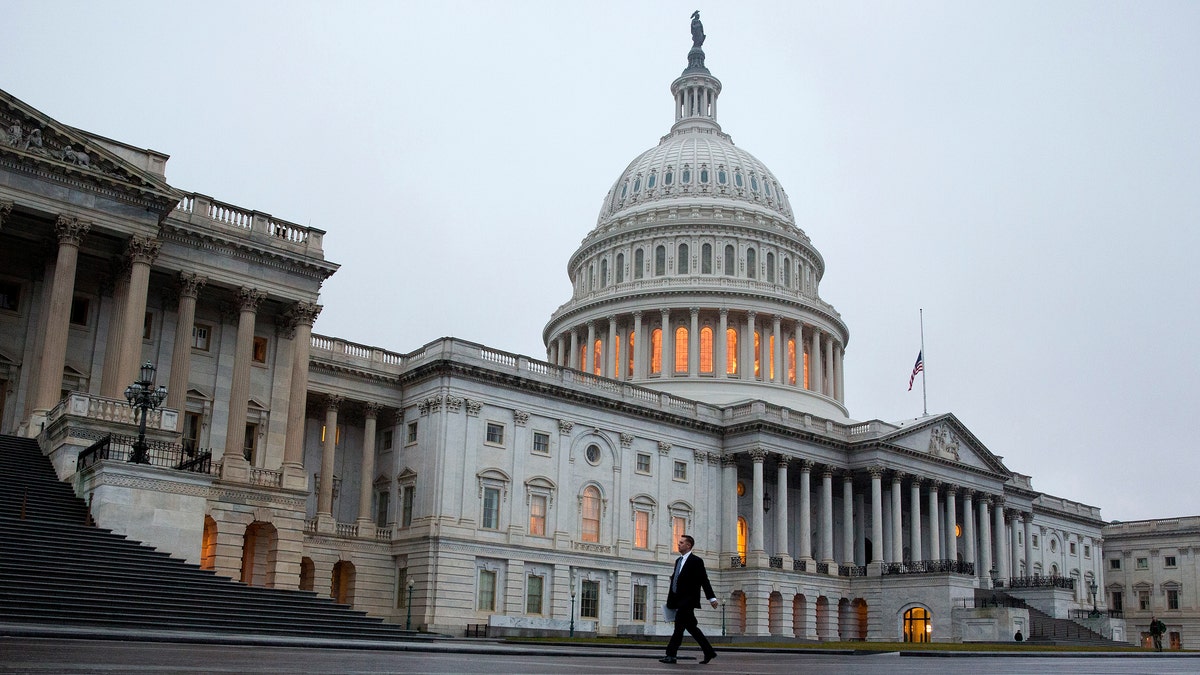
Dec. 17, 2012: A man walks past the U.S. Capitol Building in Washington. (Reuters)
Both sides in the federal talks to avert a year-end fiscal crisis signaled late Monday that significant progress had been made, with sources saying President Obama had offered a higher threshold for tax rate increases and with House Speaker Boehner's office calling it "a step in the right direction."
The late-day developments followed a 45-minute meeting between Obama and Boehner at the White House, underscoring the seriousness of the talks as the deadline approaches for a deal to stop massive automatic spending cuts and tax hikes from kicking in at the start of the new year.
Obama's most recent offer included $1.2 trillion in increased revenue over 10 years, with tax rate hikes on individual income above $400,000, a source familiar with the negotiations told Fox News. That would be a sharp departure from the president's past stance against maintaining the existing low tax rates on any income above $200,000, or $250,000 for couples. The latest offer would cut the deficit an estimated $2.4 trillion over a decade.
The two sides are getting close, but significant issues remain, a Republican source told Fox Business. They are said to have agreed to at least $1 trillion in spending cuts and at least $1 trillion in new revenue through a mix of tax rate increases on top incomes and tax code reform, though the details have yet to be worked out.
"Any movement away from the unrealistic offers the president has made previously is a step in the right direction," Boehner spokesman Michael Steel said, though he also criticized the specific mix of spending cuts and tax hikes Obama has proposed, saying it "cannot be considered balanced."
The speaker last week offered Obama a compromise by proposing a tax rate hike on those making over $1 million.
Raising the debt ceiling also is emerging a sticking point in negotiations, and indeed, a large part of the looming fiscal crisis stems from Congress' past failure to agree upon an adequate deficit-reduction plan, as mandated by the previous deal to raise the debt ceiling.
The speaker's office insists that Boehner will stand by his condition that the debt ceiling be raised only if Washington cuts spending by an amount greater than the increase.
Boehner's office tried to assure conservatives on Sunday that he was not backing off his debt-ceiling demands, following a report in The Washington Post that he offered to push off any battle over the debt ceiling for another year.
Boehner's office called the story "highly misleading."
Boehner and other Republicans have so far refused Obama's demand that he be given the authority to raise the debt ceiling whenever he wants. At issue, though, appears to be whether to include a one-time increase in the debt ceiling as part of this deal. While Boehner may be offering to include an increase that lasts a year, Obama's latest proposal called for a two-year extension.
Boehner is asking for $1 trillion in spending cuts over the next 10 years from government benefit programs like Medicare, the federal health care program for the elderly. Those cuts would defer most of a painful set of across-the-board spending cuts set to slash many domestic programs and the defense budget by 8-9 percent, starting in January.
On the revenue side, Boehner's offer calls for about $450 billion in revenue from increasing the top rate on million-dollar-plus income from 35 percent to the Clinton-era rate of 39.6 percent. The additional revenue required to meet Boehner's $1 trillion target would be collected through a rewrite of the tax code next year and by slowing the inflation adjustments made to tax brackets.
If no deal is reached, the Bush-era tax rates will expire, resulting in a significant tax hike on nearly all Americans next year.
Both sides are caught between the demands of the other, and their own parties. Many congressional Democrats want to raise taxes on households making more than $250,000. Boehner's offer marks a much higher threshold than they prefer.
White House Press Secretary Jay Carney reiterated Monday that Obama believes the only plan that achieves the "balance" Obama wants is the plan the president has put forward. Still, he said, Obama "believes that a deal is possible."
Obama also faces opposition from many Democrats to any substantive cuts in Medicare.
For his part, Boehner faces another problem. Even if he extracts $1 trillion in spending cuts from the president, some Republicans are likely to see this as a trade-off for tax increases -- not a trade-off for a debt ceiling increase.
The Associated Press contributed to this report.




